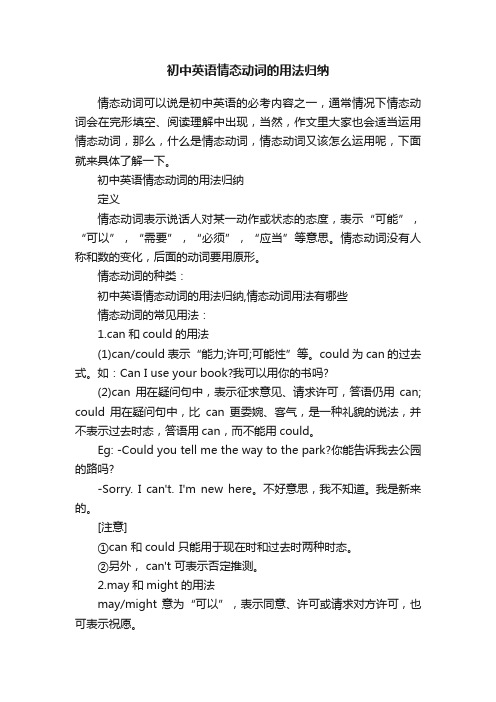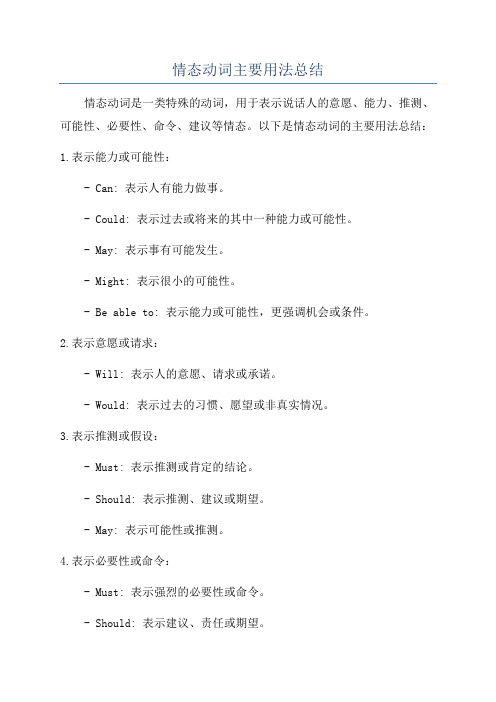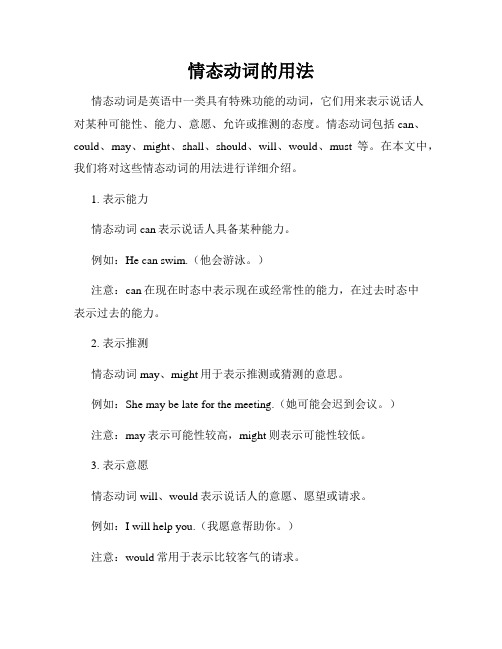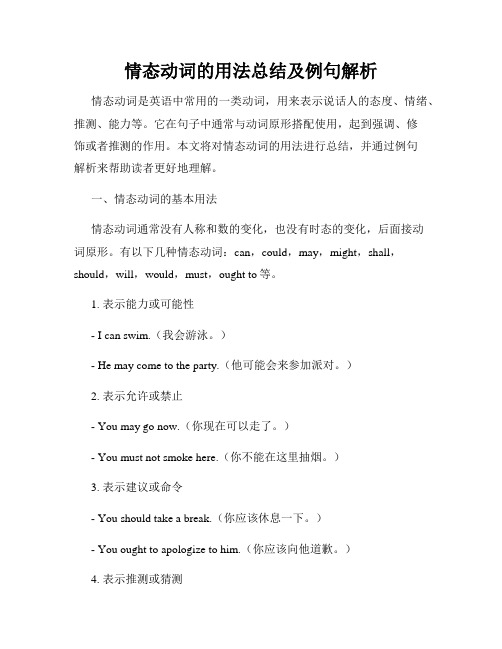初中情态动词用法总结
(完整版)初中情态动词用法总结

一情态动词的用法和辨析,情态动词表示推测和可能,由情态动词引导的一般疑问句的回答。
二 1 只是情态动词: can, could, may, might, must2 可做情态动词,可做实义动词: need, dare3 可做情态动词,可做助动词: will, would, shall, should4 特殊: have to, ought to, used to三 1 有一定的词义,但不能单独作谓语,必须与行为动词和系动词连用构成谓语。
2 无人称和数的变化。
( have to 除外)Eg: He has to stay here.3 后接动词原形。
4 具有助动词作用,可构成否定,疑问或简短回答。
四① 表示能力,“能,会”。
Eg : Can you play basketball?② 表示怀疑,猜测,常用于否定句或疑问句。
Eg :Li hua can’t be in the classroom.③ 表示请求,允许,多用于口语,译“可以”= may.Eg: youcangonow.④can 开头的疑问句,肯定句,否定句用 can 或 can’t.①can 的过去式,表示过去的能力。
Eg :I could swim when I was seven years old.②could 开头的疑问句,肯定和否定回答用 could, couldn’ t 如果 could 表示现在的委婉,用 can 回答。
Eg: Could I have a drink? Yes, you can.① 表示推测,“可能,也许”,用于肯定句。
Eg: He may come tomorrow.② 表示请求,“许可,可以”。
Eg: May I borrow your book?注:表示请求,许可时,主语为第一人称的一般疑问句,否定回答用 mustn’t“不可以,禁止,不许”,不用may not“可能不”。
③表示祝愿。
Eg :May you success.①表示“可以”,用于过去时中。
初中英语情态动词的用法归纳

初中英语情态动词的用法归纳情态动词可以说是初中英语的必考内容之一,通常情况下情态动词会在完形填空、阅读理解中出现,当然,作文里大家也会适当运用情态动词,那么,什么是情态动词,情态动词又该怎么运用呢,下面就来具体了解一下。
初中英语情态动词的用法归纳定义情态动词表示说话人对某一动作或状态的态度,表示“可能”,“可以”,“需要”,“必须”,“应当”等意思。
情态动词没有人称和数的变化,后面的动词要用原形。
情态动词的种类:初中英语情态动词的用法归纳,情态动词用法有哪些情态动词的常见用法:1.can和could的用法(1)can/could 表示“能力;许可;可能性”等。
could 为 can 的过去式。
如:Can I use your book?我可以用你的书吗?(2)can 用在疑问句中,表示征求意见、请求许可,答语仍用can; could 用在疑问句中,比can 更委婉、客气,是一种礼貌的说法,并不表示过去时态,答语用can,而不能用could。
Eg: -Could you tell me the way to the park?你能告诉我去公园的路吗?-Sorry. I can't. I'm new here。
不好意思,我不知道。
我是新来的。
[注意]①can 和could 只能用于现在时和过去时两种时态。
②另外, can't 可表示否定推测。
2.may和might的用法may/might 意为“可以”,表示同意、许可或请求对方许可,也可表示祝愿。
might 是may 的过去式,有两种用法:一种表示过去式;一种表示虚拟语气,使语气更加委婉、客气,或表示可能性更小。
以may开头的一般疑问句,其否定回答用mustn't。
Eg: MayI use your book? 我可以用你用的书吗?He might be alive. 他可能还活着。
【注意】can和may都可以用来表示请求或允许,但may比can更正式,更客气。
初中英语情态动词用法归纳

初中英语情态动词用法归纳情态动词有具体的词义,但也同助动词一样,需要与其他词语一起构成句子的谓语,另外情态动词没有人称和数的变化,情态动词后必须跟动词原形。
考点一:can,may,must等情态动词在陈述句中的用法:1. can的用法:(1).表示能力、许可、可能性。
表示能力时一般译为“能、会”,即有种能力,尤其是生来具备的能力,此时may 和must 均不可代替它。
如:She can swim fast, but I can’t . 她能游得很快,但我不能。
I can see with my eyes. 我用眼睛看。
(2).表示许可,常在口语中。
如:You can use my dictionary. 你可以用我的字典。
(3).表示推测,意为“可能”,常用于否定句和疑问句中,此时can’t译为“不可能”。
如:Can the news be true? 这个消息会是真的吗?—Can it be our teacher?那个人有可能是我们老师吗?—No, it can’t be our teacher. He is on a visit to the Great Wall.不可能。
咱们老师正在游览长城呢。
【例题】—I think Miss Gao must be in the library. She said she would go there. —No. She __be there, I have just been there. A.can’t B.mustn’t C.needn’t D.wouldn’t【解析】根据下文“我刚去过那儿”可知,应为“不可能”,can’t表示推测[答案] A2. could的用法:(1).can的过去式,意为“能、会”,表示过去的能力。
如:He could write poems when he was 10. 他十岁时就会写诗。
(2). could在疑问句中,表示委婉的语气,此时could 没有过去式的意思。
情态动词主要用法总结

情态动词主要用法总结
情态动词是一类特殊的动词,用于表示说话人的意愿、能力、推测、可能性、必要性、命令、建议等情态。
以下是情态动词的主要用法总结:1.表示能力或可能性:
- Can: 表示人有能力做事。
- Could: 表示过去或将来的其中一种能力或可能性。
- May: 表示事有可能发生。
- Might: 表示很小的可能性。
- Be able to: 表示能力或可能性,更强调机会或条件。
2.表示意愿或请求:
- Will: 表示人的意愿、请求或承诺。
- Would: 表示过去的习惯、愿望或非真实情况。
3.表示推测或假设:
- Must: 表示推测或肯定的结论。
- Should: 表示推测、建议或期望。
- May: 表示可能性或推测。
4.表示必要性或命令:
- Must: 表示强烈的必要性或命令。
- Should: 表示建议、责任或期望。
- Have to: 表示客观上的必要性。
5.表示允许或禁止:
- Can: 表示人被允许做事。
- May: 表示人有许可或请求。
- Must not: 表示禁止做事。
6.表示习惯、忠告或规定:
- Should: 表示习惯、忠告或规定。
- Ought to: 表示强烈的建议或道义上的责任。
情态动词的用法具有一定的灵活性,其意义和用法还会受上下文的影响。
特别是在否定和疑问句中,情态动词的用法和意义可能会有所变化。
因此,对于情态动词的深入理解需要通过大量的阅读和实践来逐渐掌握。
初中情态动词用法

• 通常是用may +主+V / may +宾+n. • eg:May you have a good time.祝你过得愉快。 May you be happy!祝你幸福! • May you succeed!祝你成功!
• 还可表示祝愿 May you success! • Can / could/ may都可以用来征求意见或允许,可互
句。
•
The light is on, so he must be at home now.
• 注意其反意问句的构成形式:ห้องสมุดไป่ตู้
•
• 当must表示肯定的判断、推测时,其反意疑问句 要用实际问句的助动词来构成。 • 1)It must be a book, isn’t it? • 2)They must be some books, aren’t they? • 3)She must have seen the film before,hasn’t she? • (注意反意疑问句的后半部分) • 4)You must have met uncle Wang in the shop yesterday, didn’t you? • (注意反意疑问句的后半部分)
三、用法
1.can, could (1)表示能力,“能,会” • Can you play basketball? (2)表示怀疑、猜测,常用于否定句和疑 句 中,表示“不可能或可能” • He can’t be in classroom. (3)表示请求或允许,口语,“可以”相当 may • You can go now.
• 考点三:不同情态动词的否定意义也不同: • 1.(1).can’t可译为“不会”,如:I can’t play basketball.我不会打篮球。 • (2)当句子表推测时,用can’t表达不可能,如:He can’t be ill. He is playing chess with Tom.他不可能病了, 他正和Tom下棋呢。 • (3)can’t还可用来回答“ May I …? ”这样的问句。如: May I come in ? 我可以进来吗?No, you mustn’t. / can’t. 不,你不能。 • (4)can’t还可用于固定习语中。can’t help doing禁不住 ,情不自禁 • can’t wait to do something迫不及待地要做… • 如:She can’t help crying.她不禁大哭起来。 • The children can’t wait to open the box.孩子们迫不及待地 想打开盒子。
(完整版)初中英语情态动词用法大全

情态动词用法归纳情态动词有can (could), may (might), must, have to, shall (should, will (would), dare (dared), need (needed), ought to等。
情态动词无人称和数的变化;不能单独使用,必须与其后的动词原形构成谓语一、can, could1) 表示能力(体力、知识、技能)。
Can you lift this heavy box?(体力)Mry can speak three languages.(知识)Can you skate?(技能)此时可用be able to代替。
Can只有一般现在时和一般过去式;而be able to则有更多的时态。
I’ll not be able to come this afternoon.当表示“经过努力才得以做成功某事”时应用be able to,不能用Can。
如:He was able to go to the party yesterday evening in spite of the heavy rain.2) 表示请求和允许。
-----Can I go now?----- Yes, you can. / No, you can’t.此时可与may互换。
在疑问句中还可用could,might代替,不是过去式,只是语气更委婉,不能用于肯定句和答语中。
---- Could I come to see you tomorrow?---- Yes, you can. ( No, I’m afraid not. )3) 表示客观可能性(客观原因形成的能力)。
They’ve changed the time table, so we can go by bus instead.This hall can hold 500 people at least.4) 表示推测(惊讶、怀疑、不相信的态度),用于疑问句、否定句和感叹句中。
情态动词的用法

情态动词的用法情态动词是英语中一类具有特殊功能的动词,它们用来表示说话人对某种可能性、能力、意愿、允许或推测的态度。
情态动词包括can、could、may、might、shall、should、will、would、must等。
在本文中,我们将对这些情态动词的用法进行详细介绍。
1. 表示能力情态动词can表示说话人具备某种能力。
例如:He can swim.(他会游泳。
)注意:can在现在时态中表示现在或经常性的能力,在过去时态中表示过去的能力。
2. 表示推测情态动词may、might用于表示推测或猜测的意思。
例如:She may be late for the meeting.(她可能会迟到会议。
)注意:may表示可能性较高,might则表示可能性较低。
3. 表示意愿情态动词will、would表示说话人的意愿、愿望或请求。
例如:I will help you.(我愿意帮助你。
)注意:would常用于表示比较客气的请求。
4. 表示推测的过去情态动词must常用于表示对过去情况的推测或肯定。
例如:He must have missed the bus.(他肯定错过了公交车。
)注意:must用于表示对过去情况的肯定,而might用于表示对过去情况的推测。
5. 表示义务或必要性情态动词must表示对义务、必要性或确定性的肯定。
例如:You must finish your homework.(你必须完成作业。
)6. 表示建议或应该情态动词should表示建议或应该。
例如:You should go to bed early.(你应该早点睡觉。
)注意:should还可以表示对过去情况的推测,例如:He should have arrived by now.(他现在应该已经到达了。
)7. 表示允许或许可情态动词can与may可以用于表示许可或允许。
例如:Can I borrow your pen?(我可以借你的钢笔吗?)8. 表示可能性情态动词could用于表示可能性。
情态动词的用法总结及例句解析

情态动词的用法总结及例句解析情态动词是英语中常用的一类动词,用来表示说话人的态度、情绪、推测、能力等。
它在句子中通常与动词原形搭配使用,起到强调、修饰或者推测的作用。
本文将对情态动词的用法进行总结,并通过例句解析来帮助读者更好地理解。
一、情态动词的基本用法情态动词通常没有人称和数的变化,也没有时态的变化,后面接动词原形。
有以下几种情态动词:can,could,may,might,shall,should,will,would,must,ought to等。
1. 表示能力或可能性- I can swim.(我会游泳。
)- He may come to the party.(他可能会来参加派对。
)2. 表示允许或禁止- You may go now.(你现在可以走了。
)- You must not smoke here.(你不能在这里抽烟。
)3. 表示建议或命令- You should take a break.(你应该休息一下。
)- You ought to apologize to him.(你应该向他道歉。
)4. 表示推测或猜测- He could be there.(他可能在那里。
)- It might rain tomorrow.(明天可能会下雨。
)5. 表示义务或必须- We must finish the project on time.(我们必须按时完成这个项目。
)- You ought to help him.(你应该帮助他。
)二、情态动词的细分用法除了以上的基本用法外,情态动词还有一些特殊的用法,需要注意其具体含义和用法。
1. can 和 could- 表示能力和技能:I can play the piano.(我会弹钢琴。
)- 表示请求或许可:Can I use your computer?(我可以用你的电脑吗?)- could 还可以用来表示过去的能力或许可:When I was young, I could run very fast.(小时候,我跑得很快。
- 1、下载文档前请自行甄别文档内容的完整性,平台不提供额外的编辑、内容补充、找答案等附加服务。
- 2、"仅部分预览"的文档,不可在线预览部分如存在完整性等问题,可反馈申请退款(可完整预览的文档不适用该条件!)。
- 3、如文档侵犯您的权益,请联系客服反馈,我们会尽快为您处理(人工客服工作时间:9:00-18:30)。
初中情态动词用法总结一、can的用法:1. (表示能力、功能)能,会The classroom can seat thirty students.这教室能坐三十位学生。
June can drive now.琼现在会开车了。
2. (表示可能性)可能,可能会I think the work can be completed ahead of time.我认为这项工作能提前完成。
3. (表示允许、请求)可以You can't take the book out of the room.你不可以将这本书拿出室外。
Can I use your pen?我可以用一下你的笔吗?4. (表示命令)必须If you won't keep quiet you can get out.你如不保持安静,就请你走。
5. (表示偶然发生的可能性)有时会It can be quite windy there, especially in spring.那里有时容易刮风,特别在春季。
6. (表示惊讶)究竟;竟至于What can it possibly be?到底那是怎么一回事?二、could的用法can的过去式;(用于虚拟语气,表示与事实相反的设想)能;可以;(表示可能性)可能;(用于婉转语气)能,可以三、may的用法1.表示请求和允许,意思是:可以He may come if he likes. 如果他想来,可以来2.表示祝愿,意思是:祝…,(但愿)。
May the friendship between our two peoples last forever. 祝两国人民的友谊万古长青。
3.表示推测,意思是:可能(会),或许(会)。
It may rain this evening. You'd better take an umbrella. 今晚可能要下雨,你最好带上雨伞。
四、must的用法1.表“必须”。
You must talk to them about their study.你必须同他们谈谈关于他们学习的事。
2.在否定结构中表不许。
You mustn't leave here.你不能离开这儿。
3.表坚定的建议。
You must come and see us as soon as you get to Shanghai.一到上海你得马上来看我们。
4.表推测,暗含有很大的可能性,用在肯定句。
He must be ill. He looks so pale.他肯定是病了。
他的脸色那么苍白。
注意:may 暗含的可能性较小。
must 暗含的可能性较大。
否定的猜测用can'tThe baby can't be ill. He is so active.那宝宝不大可能是病了。
他那么活跃。
五、might的用法might表示的可能性太小,没有足够的说服力去职责别人。
can, could 之间的区别,和may,might 之间的区别在于,虚拟句和过去时态用后者,表示的可能性比原词小,但大部分时候2者可以互换,不会产生歧义或者对表述造成干扰。
六、should的用法1.should 作为助动词shall 的过去式,可以在间接引语中与第一人称主语搭配,表示过去将来时间。
2.should 作为情态动词,通常用来表示现在或将来的责任或义务,译作“应该”、“应当”,这时它可以和ought to,be supposed to 互换使用。
例如:You should (= are supposed to )complete your test in time.你们应该按时做完你们的实验。
3.should 作为情态动词,可以用在条件状语从句中,表示语气较强的假设,译作“万一”、“竟然”,这时也可将should 置于从句之首,即将should 放在主语前面,而省略从属连词if. If it should rain tomorrow,I wouldn't go. (= Should it rain tomorrow,I wouldn't go.)万一明天天下雨,我就不去了。
七、would的用法1.would是will的过去式,Would you like~?表示请求、劝说,是很客气的说法。
Would you like a cup of tea?您愿意喝杯茶吗?2.主语+would like to~表示“想要……”的意思上,与…want to~意思一样,但用此句型较客气。
I want to ask you a question.3.最基本的虚拟语气句型:主句用would/ should/ could/ might +动词原形。
八。
ought to的用法ought to 是一个可以加上to 的情态动词其意思与should是一样的,但是ought to 不能用于虚拟语气中表示推测,而should可以ought to与should意思接近,大多数情况下二者可以互换,但是should谈的是自己的主观看法,ought to则更多反映客观情况,在谈到法律、义务和规定时使用。
如:We should/ought to help each other and learn from each other in our work.She is your mother, so you ought to support her.1. I told Sally how to get here, but perhaps I _______ for her.A. had to write it outB. must have written it outC. should have written it outD. ought to write it out2. —There were already five people in the car but they managed to take me as well.—It _______ a comfortable journey.A. can not beB. shouldn’t beC.mustn’t havebeen D. couldn’t have been3. It’s nearly seven o’clock. Jack _______ be here at any moment.A.mustB.needC. shouldD. can4. Johnny, you _______ play with the knife, you _______ hurt yourself.A.won’t;ca n’tB. mustn’t; mayC. shouldn’t; mustD. c an’t; shouldn’t5. The fire spread through the hotel very quickly but everyone _______ get out.A.had toB.wouldC. couldD. was able to6. —When can I come for the photos? I need them tomorrow afternoon.—They _______ be ready by 12:00.A.canB.shouldC. mightD. need7. —I stayed at a hotel while in New York.—Oh, did you? You _______ with Barbara.A. could have stayedB.could stayC.would stayD. must have stayed8. —Are you coming to Jeff’s party?—I’m not sure. I _______ go to the concert instead.A.mustB.wouldC.shouldD. might9. I was really anxious about you. You _______ home without a word.A.mustn’t leaveB. shouldn’t have leftC. couldn’t have leftD. needn’t leave10. —Is John coming by train?—He should, but he _______ not. He likes driving his car.A.mustB.canC. needD. may11. A left-luggage office is a place where bags _______ be left for a short time, especially at a railway station.A.shouldB.canC. mustD. will12. I wonder how he _______ that to the teacher.A. dare to sayB. dare sayinC. not dare sayD. dared say13. When he was there, he _______ go to that coffee shop at the corner after work every day.A. wouldB. shouldC. had betterD. might14. It has been announced that candidates _______ remain in their seats until all the papers have been collected.A. canB. willC. mayD. shall15. How _______ you say that you really understand the whole story if you have covered only a part of the article?A. canB. mustC. needD. may16. —I hear you’ve got a s et of valuable Australian coin. _______ I have a look?—Yes, certainly.A. DoB. MayC. ShallD. ShouldAnswer:1. C。
“ought to / should have+过去分词”表示后悔当初该做但却没做某事。
